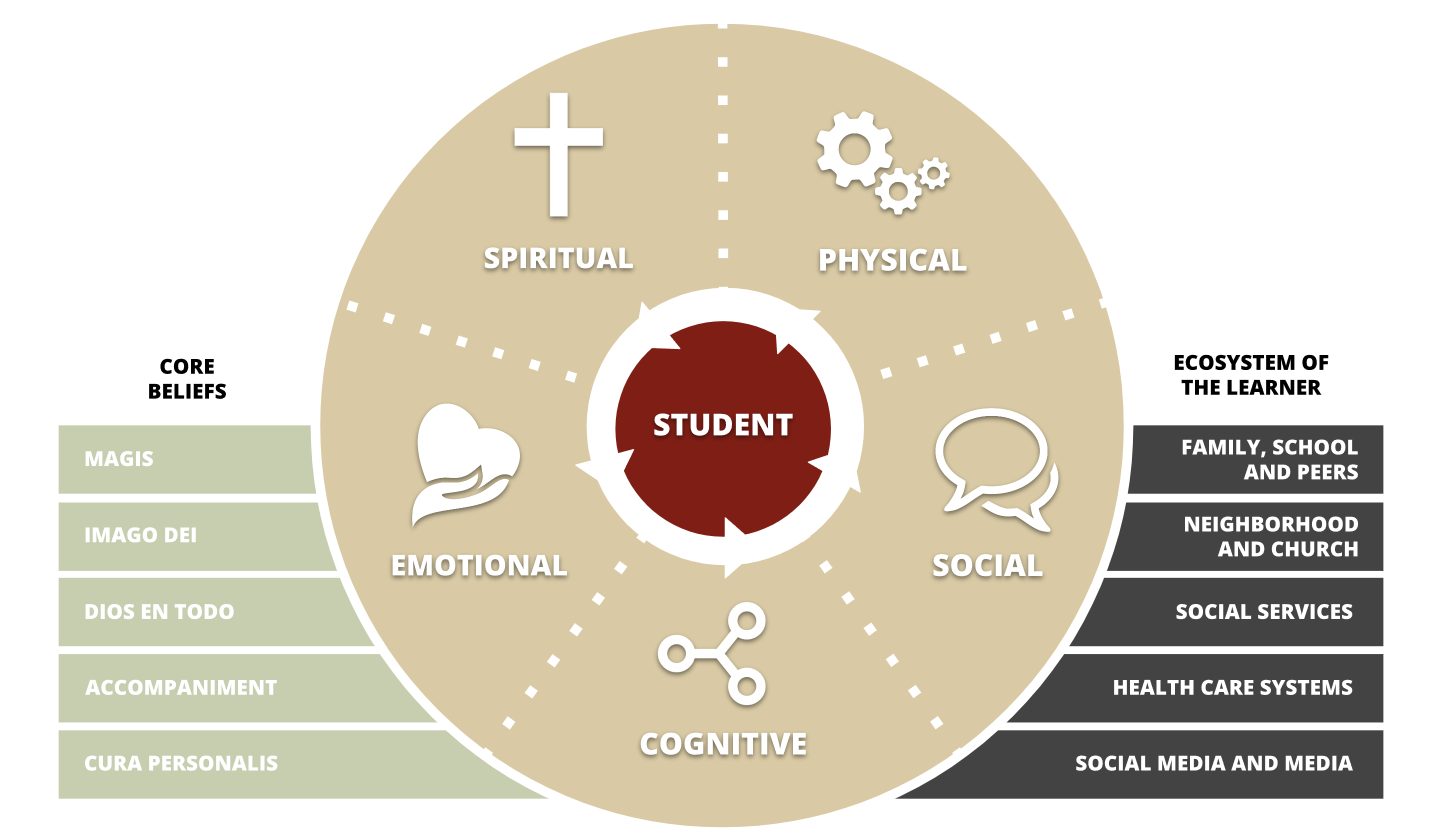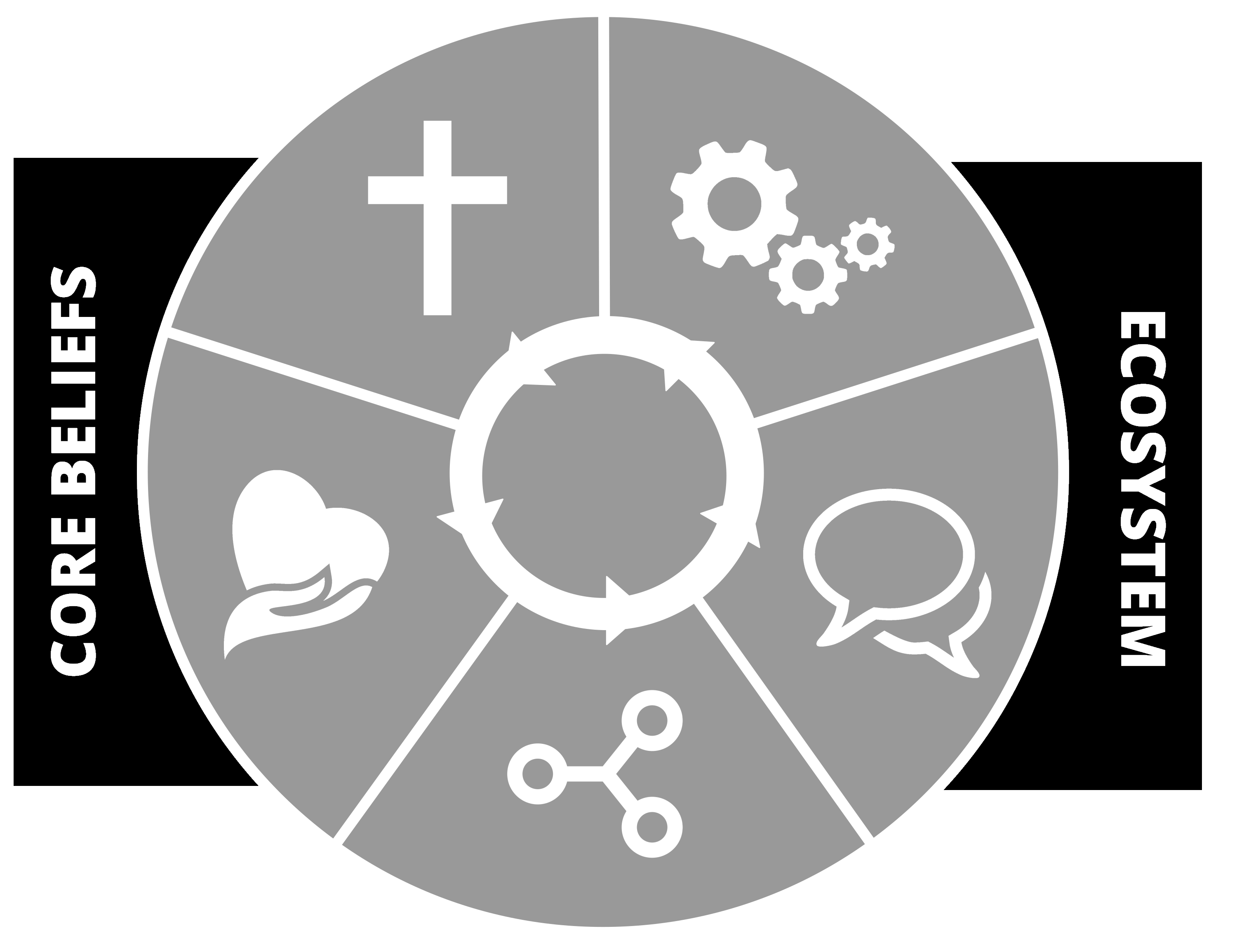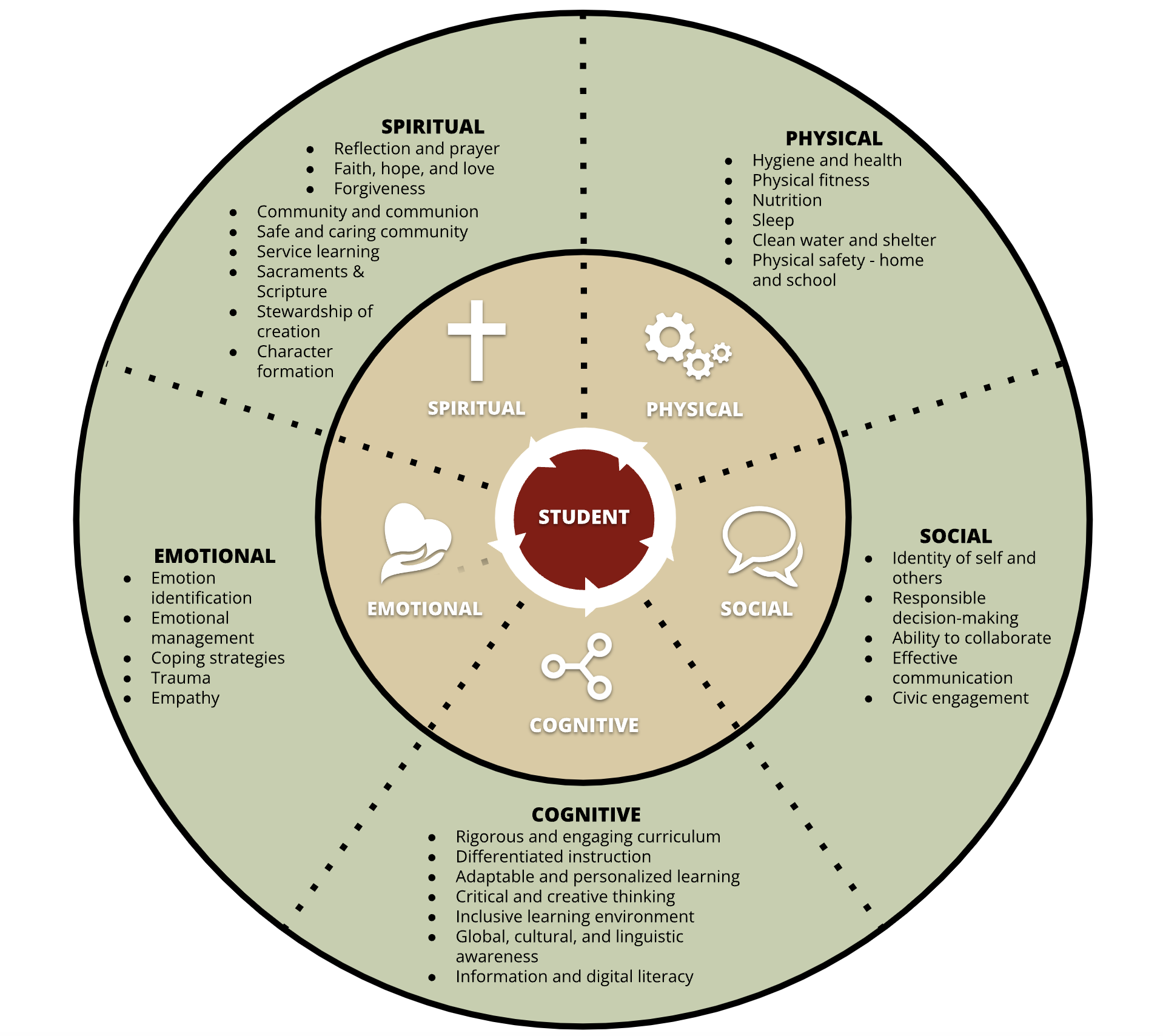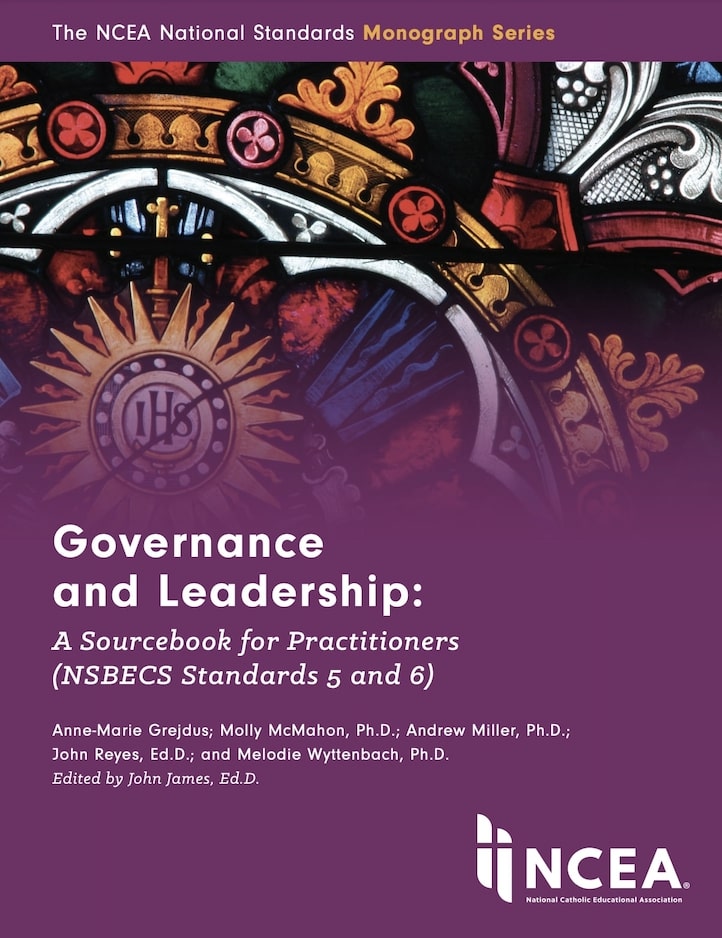Research Projects
The Roche Center team conducts research exploring and interrogating critical issues in Catholic education. Research projects are chosen to align with Center mission, vision, and values. Check out our featured research projects below and keep an eye out for more exciting research updates!
Research Projects
Whole-Child Education

Whole-child education in Catholic schools embraces a comprehensive approach that addresses the cognitive, social, physical, emotional, and spiritual aspects of learning. Whole-child education constitutes an approach rooted in Catholic social teaching that acknowledges the multidimensional nature of human development. This paradigm challenges educational institutions to transcend a singular focus on academic achievement, advocating for a holistic approach towards development, empowering Catholic schools to participate in the saving mission of the Church. The overarching objective of whole child formation is to ensure that individuals receive a well-rounded education that addresses their diverse needs, promotes their overall well-being, and endows them with the requisite knowledge, spiritual depth, and moral grounding essential for success in life.
Below, find more details for this project, including our Whole-Child Education framework, checklists, publications, Fall 2024 webinar series, and upcoming Fall 2025 events.
View the full Whole-Child Education project website by clicking the project website button.

The Core beliefs and Ecosystem of the Learner
At the foundation of the framework, the left-hand side is underpinned by core beliefs that help to ground the Whole-Child Education Framework in Catholic and Ignatian inspired values. Additionally, the right-hand side of the framework acknowledges the diverse environments and circles of social support that contribute to a child's development, denoted as the "ecosystem of the learner."
Spiritual Domain
The spiritual domain of whole-child education involves exploring questions of meaning, purpose, values, and beliefs. It recognizes that individuals have a spiritual dimension that goes beyond religious affiliations and encompasses their search for identity, ethics, and connections to something greater than themselves. Spiritual development fosters self-reflection, moral reasoning, and the development of personal values, contributing to a sense of purpose, meaning, and a holistic worldview.
Cognitive Domain
The cognitive domain of whole-child education refers to the development of intellectual abilities, thinking skills, and knowledge acquisition. It involves critical thinking, problem-solving, creativity, and the acquisition of academic knowledge in various subjects. Cognitive development promotes curiosity, intellectual exploration, and the ability to analyze, evaluate, and apply knowledge to real-world situations.
Emotional Domain
The emotional domain of whole-child education refers to the development of emotional intelligence, self-awareness, and emotional well-being. It involves recognizing and managing one’s own emotions, understanding the emotions of others, and developing skills for building healthy relationships. Emotional development fosters empathy, resilience, self-regulation, and the ability to navigate and express emotions in a healthy and constructive manner.
Social Domain
The social domain of whole-child education focuses on the development of social skills, interpersonal relationships, and a sense of social responsibility. It involves communication skills, collaboration, empathy, cultural competence, and understanding social dynamics. Social development promotes positive relationships, cooperation, respect for diversity, and the ability to contribute to the well-being of communities and society.
Physical Domain
The physical domain of whole-child education focuses on the development of physical health, well-being, and motor skills. It encompasses aspects such as nutrition, exercise, body awareness, and the development of fine and gross motor skills. Physical development promotes overall health, coordination, physical fitness, and the understanding of the importance of a healthy lifestyle.
The Whole-Child Convening at Boston College yielded a series of "checklists" derived from the examination of essential elements. While acknowledging the comprehensiveness of these essential elements in delineating how schools can facilitate student development within a specific domain, it is also acknowledged that their use may vary based on context such as the school's culture, the demographic composition of its student body, and the age range of the learners. Schools are strongly urged to approach these checklists from an asset-based perspective. The periodic utilization of these checklists, at a minimum on an annual basis, is advocated to not only discern areas of strength within the school and classrooms but also to inform strategic plans that holistically address the developmental domains. The emphasis is on leveraging identified strengths as a foundational platform for comprehensive advancement across all domains.

Recent publications from the Whole-Child Education project
Read Molly McMahon and Melodie Wyttenbach's NCEA Momentum Magazine article entitled, "A Distinctly Catholic Approach to Educating the Whole Child."
We present the Roche Center Whole-Child Education Framework in this 2023 article.
We present how the Roche Center Whole-Child Education Framework is related to Pope Francis' vision in this 2023 article in The Review of Faith & International Affairs.
Learn more about The Playbook for Whole-Child Education in U.S. Catholic Schools, published by the National Catholic Educational Association (NCEA) and find a link to purchase the Playbook on our Publications page.
In fall 2024, the Roche Center hosted a Whole-Child Education webinar series in support of the forthcoming NCEA publication, The Playbook for Whole-Child Education in U.S. Catholic Schools.
Webinar presenters included Dr. Christina Cipriano of Yale University; Dr. Sean McGraw of Boston College; Mike Heidkamp and Jon Robertson of the Cristo Rey Network, along with Ashley Hasling of Notre Dame Cristo Rey High School in MA; and clinical therapist and lecturer, Tim Klein. Below, please find the YouTube links for the four webinars, as well as the webinar series digital booklet and readings and resources provided by the presenters.
Fall 2024 Webinars - YouTube Recordings & Resources
The Possibility and Promise of Educating the Whole Child - Christina Cipriano, Ph.D.
Educating the whole child - inclusive of their academic, social, emotional, behavioral, and physical development and health - requires intentionality. In this September 24, 2024 webinar, Dr. Christina Cipriano, Yale Professor and internationally recognized scholar of social and emotional learning, discussed the possibility and promise of educating the whole child, sharing the latest science and applications of evidence-based strategies to support all students to thrive in school.
Catholic Education: Flourishing Children Are Whole Children - Sean McGraw, Ph.D.
Whole child education has always been a staple of Catholic education. But what truly sets this sector apart? In this October 29, 2024 webinar, Sean McGraw, co-founder of the ACE program at Notre Dame and a Political Science Professor at Boston College, explored how the spiritual domain of development imbues meaning to a child’s holistic education. He explored how Catholic education is distinct in its invitational, sacramental, eucharistic, and unitive nature. A key takeaway from the webinar was that education in a "Catholic key" inspires educators to lean into their school’s Catholic identity as a source to support student flourishing - including connection and belonging, faith and reason, service and solidarity.
Designing Classrooms of Care & Cognitive Demand - Mike Heidkamp, Jon Robertson, & Ashley Hasling
All domains of the whole child are interconnected so how can we more intentionally bring these domains in contact with each other in the classroom? In this November 19, 2024 webinar, Mike Heidkamp and Jon Robertson, Senior Directors at the Cristo Rey Network, along with Ashley Hasling, Mathematics Teacher at Notre Dame Cristo Rey High School in MA, discussed how a values- and inclusion-based approach can be taken into classrooms to support all children in engaging in cognitively demanding, grade level tasks.
Cultivating Purpose for Holistic Education - Tim Klein
Educating the whole child through a Catholic framework is strongly rooted in purpose. How do we cultivate that sense of purpose in a child? In this December 5, 2024 webinar, Tim Klein, co-founder of the MPOWER program for low-income and first-generation students, discussed how we can empower students to build a sense of purpose that is rooted in their understanding of themselves and the world around them.
Forming the Formators: Exploring the Holistic development of Catholic educators
Wednesday, October 15 - Thursday, October 16, 2025
Join us for a two-day event at Boston College as we exchange innovative ideas and evidence-based practices to support the holistic development of adult educators in our Catholic schools. Bringing experts together to discuss this topic, this convening will explore adult formation in four domain areas: Mission Orientation, Adult Wellbeing, Adult Capacity, and Adult Relationships.

Governance & Leadership
Leadership and governance in Catholic schools are essential elements of excellent and equitable Catholic PreK-12 schools, often serving as the catalyst and conduit for the reinvigoration and revitalization of Catholic schools. The Center’s research agenda encompasses key issues within this area, including critical analysis of governance and leadership structures, systems, and processes; conceptualizing frames of leadership in a post-pandemic context, and emergent practices and innovations for school and system leadership.
Recent Publications on Governance & Leadership
Governance and Leadership: A Sourcebook for Practitioners. (2024). National Catholic Educational Association (NCEA). The NCEA National Standards Monograph Series. https://ncea.org/NSBECS/iCore/Store/StoreLayouts/Item_Detail.aspx?iProductCode=D-ADM-31-1646&Category=DOWNLOADS
Miller, A. F., Reyes, J., Wyttenbach, M., & Ezeugwu, G. (2023). The limits of the “systems of schools” approach: Superintendent perspectives on change efforts in US Catholic school systems. Journal of Educational Change, 24, 943-970. https://link.springer.com/article/10.1007/s10833-022-09475-1
Sorkin, D., Wyttenbach, M., Reyes, J., Warner, M. (2023). Leading in liminality: Implications on individual and collective identity, and knowledge creation for Catholic school leaders. Journal of Catholic Education, 26(2), 50-66. https://files.eric.ed.gov/fulltext/EJ1410967.pdf
Miller, A. F., Wyttenbach, M., & Nuzzi, R. J. (2020). Navigating the uncharted pandemic waters: An examination of the role of the Catholic school superintendency in response to COVID-19. Journal of Catholic Education, 23(1), 120-141. https://eric.ed.gov/?id=EJ1278613
Reyes, J., Alonzo, V., & Wyttenbach, M. (2022). Practices, perceptions, and perspectives of Hispanic Catholic school diocesan leaders. Journal of Catholic Education, 25(2), 25-43. https://digitalcommons.lmu.edu/cgi/viewcontent.cgi?article=2320&context=ce

Cultivating Engagement: National Study Examining Hispanic Parental Engagement in Catholic Schools
The National Study Examining Hispanic Parent Engagement in Catholic Schools aims at achieving three specific goals:
- Understand and document more formally how Hispanic parents contribute to the life and mission of Catholic schools in the United States;
- Identify trends and best practices that illustrate fruitful collaborations among Hispanic parents and schools leaders (or the lack of such collaborations);
- Recognize and describe effective pathways to Hispanic parental engagement that may serve as models of engagement for other families in Catholic schools.
With 320,000 Hispanic students enrolled in Catholic schools, tens of thousands of Hispanic families invest countless resources to educate their children and support these institutions. This project seeks to bring light to the presence and contributions of Hispanic parents in these institutions, and document more explicitly how this population strengthens the Catholic school experience.
If your school is interested in participating in this study, please complete this interest form!
(Arch)diocesan Catholic Schools' Office Operations
The purpose of the study is to gather information on key aspects such as staffing, department responsibilities, and how central office functions support schools and students. By gathering this information, we aim to:
- Identify patterns that may contribute to better resource allocation and support for schools;
- Provide comparative data that superintendents can use to evaluate and improve their central office efficiency;
- Share best practices across dioceses, fostering collaboration and innovation in central office management.
The results of this survey will be compiled and shared with participating superintendents and may be used to inform policy recommendations, improve operational efficiency, and shape future professional development efforts. It will contribute to a deeper understanding of how central offices function and how they can better support Catholic school educators, students, and communities.
If you are a Catholic school superintendent, please complete this survey before May 15, 2025!
Accompaniment and Wellbeing of Catholic School Leaders
Recognizing the significant need for interventions that build robust leadership capacity, this study aims to examine how the professional and spiritual practice of accompaniment in leadership formation programs for Catholic school leaders impacts the well-being and mental health of in-service Catholic school leaders. The insights and analysis generated from the study are aimed at:
(1) contributing to the body of knowledge around the dynamics of supporting school leaders’ mental health and well-being, and,
(2) more importantly, conceptualizing an emergent body of approaches for formalized, accompaniment-centric interventions that support Catholic school leaders’ mental health and wellbeing.
This study is being conducted in collaboration with Australian Catholic University.
If you are currently serving as a Catholic school leader in a K-12 Catholic school in the United States, please complete this survey!

